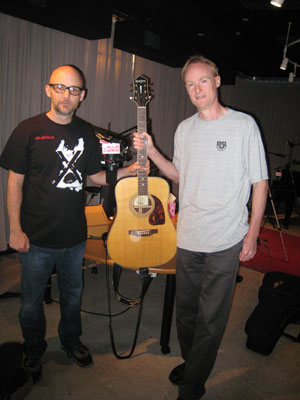WNYC's John Schaefer

A native of New York City, John Schaefer has been a WNYC radio host and music curator for more than 25 years. His long-running show “New Sounds” explores a diverse galaxy of genres old and new, and his program “Soundcheck” interviews artists and covers industry news. “Soundcheck” also recently began live broadcasts from the Jerome L. Greene Performance Space in Manhattan.
TMN: You recently broadcasted live with Lou Reed and Santigold. How’d it go?
JS: The first broadcast from the Greene Space was, like most live “remote” shows, a case of barely controlled pandemonium. We might’ve been a little too ambitious, but we wanted to try everything at once: live acoustic music, live electric music, live phone calls, live comments from the audience in the space, a slide show (also available on the web site to radio listeners), and several audio clips that would be audio-only on the radio but which we thought needed to be video clips as well for the live audience. Also, we had commissioned a work whose premiere came down pretty close to the wire, which was nerve-wracking. And we had Lou Reed, who needed to be treated like, well, Lou Reed. You can’t just say, “Sit over there for a while and we’ll call you when we need you.”
Anyway, almost everything worked. Santigold’s clip from the music video “L.E.S. Artistes” ended up being audio-only; we don’t know what happened to the video. Lou did a version of “Romeo Had Juliet” which included a little surprise: two f-bombs that are not in the original. But the engineer was alert and able to catch them before they hit the air. Thankfully, our on-air delay system was working too.
TMN: What’s something you’re not good at, but wish you were?
JS: Soccer. I try to play every Sunday. Playing soccer in New York is like a magnet for immigrants who miss the game. Mexican, French, Italian, English—the game has become a Benetton ad, and the level of play has risen way above my very mediocre skills.
TMN: “New Sounds” has an eclectic approach, but tends toward the obscure. How did the format start?
JS: “New Sounds” was never intended to be willfully obscure, and in fact some of the composers who were still pretty obscure when I started the show are now well known. Philip Glass, Laurie Anderson, recent Pulitzer Prize-winner Steve Reich are just a few examples. Ravi Shankar, Keith Jarrett, Yo Yo Ma—these are top-drawer musical talents. But the show was specifically started to play types of music that were falling between the cracks—the cracks between rock, classical, jazz, folk, and world music, and the cracks between the ever-narrowing radio formats out there. So almost by definition you hear a lot of music you won’t hear in many other places.
But “obscure” is a funny word, because if you’re not in a certain musical circle, even the best-known names are obscure. If I described someone as having the street smarts of Jamie T and the no-holds-barred stage presence of Girl Talk, well, those are absolutely obscure names to the millions of people not into the UK indie rock scene or the mashup/sampling scene.
TMN: What is your favorite object in your office?
JS: My favorite thing in the office is the acoustic guitar that Moby left in the studio one day a few years back. I don’t think he was intentionally donating a guitar to us, but when we told him it was still in the studio he didn’t want it back, so I now keep it in the office, where it’s available for emergency use if a musician needs it. I use it myself because it’s a hell of a better guitar than the beat up old Epiphone I have at home.
TMN: Has the digital revolution had a significant effect on your program?
JS: The digital thing has been great from a purely practical point of view. Composers can send links instead of CDs, and if I am putting together a program of pieces that are thematically related, and suddenly think of something that would fit but that may not be in our library, I can usually find it and grab it somewhere, either through eMusic, or by contacting the musicians and having them post something online, or in the worst case scenario buying it from iTunes. Actually, with the DRM-free iTunes, that’s no longer a bad option.
TMN: What was the most terrifying moment of your childhood?
JS: This is sort of like the old “wow, you’re from New York—were you ever mugged?” question. I never know how to answer it because there are so many episodes. Growing up in New York in the ‘70s was proof that what didn’t kill you made you stronger. But once, when I was in second grade, I got out of school, went to the bus stop, and waited for my younger brother to come out from his first grade class. He never did. He was, for some reason, off early that day, but I either didn’t know or had forgotten. All I knew was that my job was to get my brother home on the bus—a city bus, not a school bus. After awhile, it started getting dark, and the school was dark and deserted. I was really scared and didn’t know what to do, and finally realized my brother wasn’t coming out of the school. I got on a bus, went home, and found police at the house and my mom a wreck and my father out scouring the neighborhood. I think I might’ve been more terrified at that moment than I was standing alone watching the buses go by.
